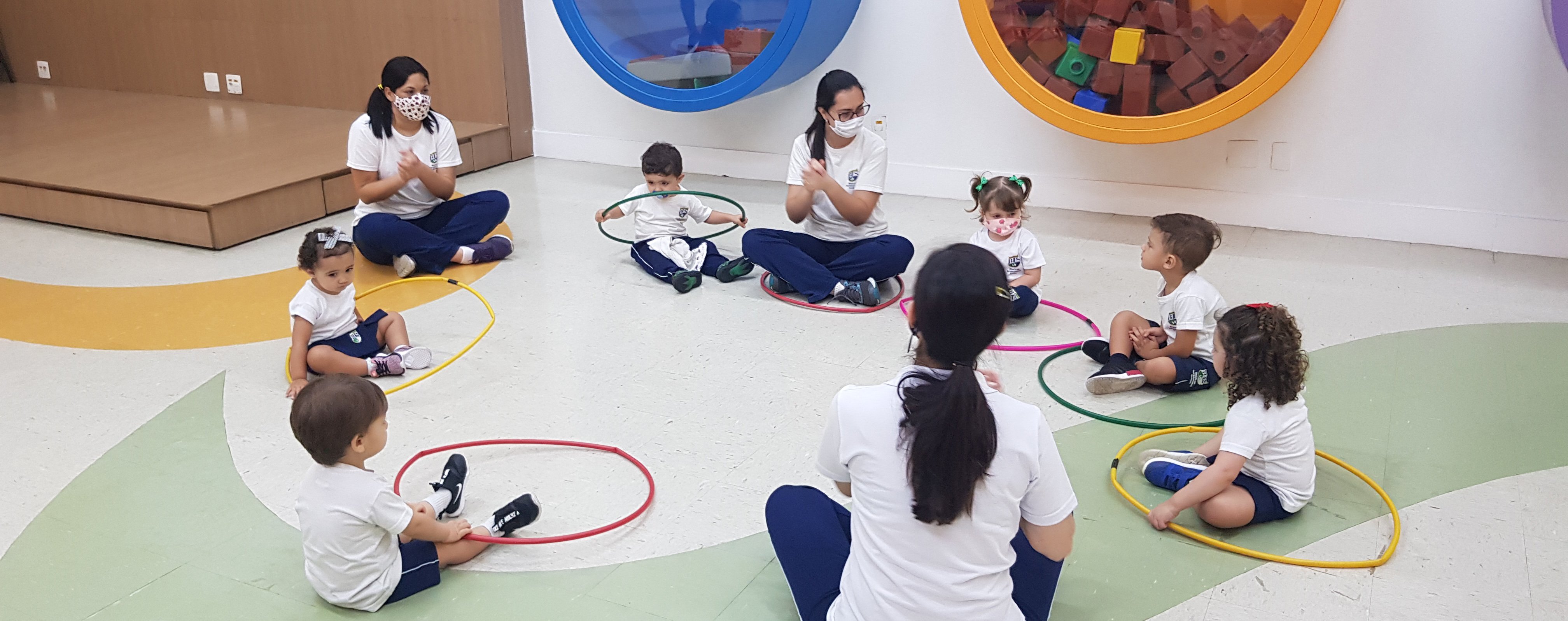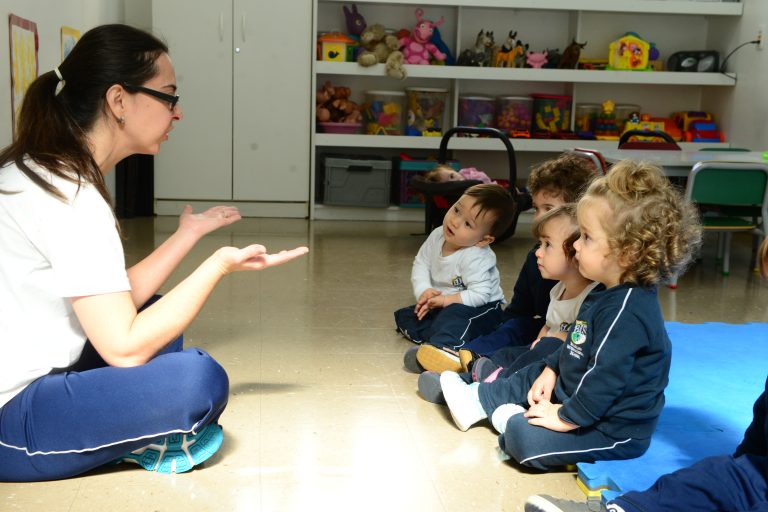When we think about Early Childhood, it is important to understand that this educational cycle contemplates the human development phase, characterized as the first step of education from 0 to 6 years of life.
It is also worth noting that this stage is what determines the acquisition and establishment of fundamental abilities learned by the children. It is in this period only that a series of behaviors and interactions with the environment and people happens, which is part of childhood development.
Thanks to this incredible children's brain plasticity capacity, even more evident is this stage, which is a crucial period for personality formation, construction of values and to sharpen curiosity.
Therefore, it is worth knowing the importance of the pedagogical work performed in Early Childhood, once the stimuli received in the First Infancy is carried out throughout the whole adult life of a person.
Thinking about this, the Brazilian International School counts with an Early Childhood project in São Paulo, focusing on the global development of children. The institution works with bilingual education from the entrance of the students, from the first (1) year of age.
Pedagogical proposal for early childhood education
Brazilian International School marks the pedagogical proposal of Early Childhood education, taking into account a very important tripod: CARE, PLAY and EDUCATE. Children learn by playing and also when they are well cared for, welcomed and supported.
The acquisition of a second language in the first infancy positively impacts on the academic and social development of a human being. Since ealy, bilingual children show an early development, becoming cognitively more flexible than those who are monolingual.
Interdisciplinarity assumes an important role on how the Brazilian International School conducts this stage of basic education. The pragmatic content is ministrated by means of projects that guide activities on the different areas of knowledge: prepared according to the interests and solicitation of the students, without neglecting the official curriculum.
Caring
At the Brazilian International School, the look at the reception is given from the moment of the first contact of the families with the Pedagogical Team, in order to guarantee that the adaptation to the new school context and new references is a significant moment in the children's lives.
In addition to emotional care, in Early Childhood, care for the physical health of each student is essential. A look at a balanced and healthy diet and care with cleanliness and hygiene also ensure that the child always experiences pedagogical experiences in a comprehensive way.
Play Time
Children learn by playing. This is a popular and generalized affirmation, but which is in fact taken very seriously in all pedagogical proposals for Early Childhood Education at the Brazilian International School.
The act of playing is a phenomenon inherent to the discovery of childhood experiences. The child who plays develops in its entirety. In this way, we guarantee playful spaces and proposals that encourage students to explore creativity, curiosity, experiences with nature, thus expanding their knowledge of the world.
More than that, the act of playing in the bilingual proposal in Early Childhood at the Brazilian International School also provides, by the means of guided games and cultural games, the acquisition and extension of the English Language vocabulary. Children learn the language by playing and living the second tongue. Learn by playing and living!
Education
Considering the tripod necessary to guarantee the support of the pedagogical work in Early Childhood Education, it is noteworthy that the "content and experiences" proposed by the College contemplate, in the first place, respect and guarantee to the Learning Rights and Fields of Experience listed in the Brazilian Common Core.
From the socio-interactionist proposal in which the environment and the people who are part of the students' school life become "mediating bridges" for the construction of their knowledge, we carry out work through interdisciplinary projects that guide the know-hows, experiences and cognitive discoveries.
Specific objectives of the early childhood education and the experience fields at the Brazilian International School
Based on BNCC's Fields of Experience, the School directs its daily work in Early Childhood Education, providing the evolution of each child, respecting their individuality. The exercise of empathy, for example, has been developed since C1 through projects and subprojects where students put themselves in the other's shoes and improve coexistence.
In daily pedagogical practice and in extra-class activities, movement is a priority, providing the formation of body awareness and the identification of limits and potential. Through circuits, guided parks, in addition to the usual games, educators work these notions consistently.
Living with different artistic expressions expands the children's repertoire of expression, especially when stimulated in early childhood. Exploring traces, sounds, colors and shapes in a liberating experience, Brazilian International School students create their own productions and develop their critical and aesthetic sense.
Logical reasoning and problem solving find space in activities through abstract and concrete games. In this way, and based on the children's own suggestions and questions, themes for pedagogical projects arise that discuss the notion of time, natural and sociocultural phenomena.
The alphabetical process begins well before writing and reading of the first words. Brazilian International School develops reading circles, "telling of stories" and dramatization of the Portuguese and English Language to amplify orality, comprehension, incite imagination and vocabulary development.
Reading, mediated by the educators at the Brazilian International School, serves as a conducting wire to the introduction of the universe of writing.
EARLY CHILDHOOD: EXTRACURRICULAR CLASSES
For Colégio BIS, it is essential to promote the musical, bodily and artistic diversity of students from an early age. That's why the offer of weekly classes in Arts, Music, Theater and Physical Education are part of the institution's project.
All of the other activities, in which the English language is always present in a natural and enjoyable way, have the goal to contribute to the evolution of children's social-emotional, cognitive and motor skills.
Art, theater and music

Art has to be recognized as a poli cultural manifestation, and not limited only to drawing or painting. At Brazilian International School, music, dance, plastic art, theater, handicraft, performing arts, cinema, literature, poetry and philosophy are part of all student's construction process of knowledge.
Considering all of the importance of Art in education, it's indispensable that the contact with "making art" happens from an early age. Brazilian International School worries with the pursuit of a high quality artistic education, always connected with other subjects. The commitment to the humanist and integral formation of each student begins in Early Childhood Education.
Music classes at Brazilian International School also occupy an important role on the knowledge construction of students, having the objective of awakening and developing a musical taste, favoring the development of sensitivity, creativity, rithimic sense, concentration, socialization and affectivity.
At the phase that behind the first contact with music, classes are ministrades in a playful manner and with plenty of freedom. The activity's proposals stimulate corporal consciousness, gesture and rithimic exploration, also encouraging artistic expression throughout the body.
Musical exploration happens in consonance with the appeal to other senses such as sight and touch, essential for a more complete assimilation. As children develop, practices adapt to new phases and skills, including rhythmic activities with the body (running, jumping, clapping, etc.).
This understanding of the body is also important in english theater classes at School, where the student is invited to communicate with their own body. These moments emphasize vocal and facial expressions, the different movements and constant usage of imagination.
The non-use of objects (most of the time) intensifies the use of 'make believe', where students begin the process of assimilating the English language through repetitions in speech and body movements. The Brazilian International School offers artistic connections that drive the student through co-creation and spontaneity.
Physical Education (PE)
In Early Childhood, Physical Education classes play a very important role. The child of this stage is in full development of motor, cognitive, emotional and social functions, moving from the individualism stage to that of group experiences. The space created by these classes is conducive to promoting learning through playfulness.
Games and recreation provides learning through experiences with the body, material and social interaction. Thus, children discover themselves, explore their limits, relate to other people and express their feelings.
Library
Our library is composed of modern and complete material. By means of ludic strategies, students are encouraged to develop a taste for reading and the good usage of books.
Throughout the year, we develop literature projects from a thorough work that brings to the student's radar different works from big international and national author, from Oscar Wilde, with the emocional story in "The Selfish Giant", to Julia Donaldson and the iconic "The Grufallo" and the all time star "Sítio do Pica-Pau Amarelo", from Monterio Lobato.
Nature Space
Environmental conscience, important and necessary as well, is developed at the Nature Space. The proposed activities are related to the development of sustainable behavior, getting to know the garden, the plants, cultivating and following the production cycle up to the harvest and processing of food or its pure consumption.
Cooking
Good eating habits are cultivated still in infancy. During cooking classes, children have the opportunity of preparing and tasting different foods and recipes, utilizing, most of the time, what is grown in the garden.
They observe how foods are prepared and the physical changes that happen during this process. They taste, smell, feel the texture and tell if they liked it or not.
Technology
A complete education, nowadays, also involves the relationship with technology. Considering this, the proposal of this activity is to integrate this resource to the pedagogical projects. Students from the C4 and C5 classes, for example, work directly with the Matific platform, which approaches Mathematical teaching in a ludic way.
The STEAM methodology (Science, Technology, Engineering, Arts and Mathematics) for the solution of problems is one of the methods of integration of technology with different areas of knowledge.
The classes are merged between the utilization of Ipads and handwork. In this way, children will be able to make a connection with the real world, as well as utilizing their own volitional impulses.
|
Educação Infantil/ 1° ano do Ensino Fundamental I
|
Idade
|
Observações para matrícula de acordo com a Deliberação CEE n.º 166/2019 e Parecer CEE 137/2019 |
|
C1
|
1 ano
|
Crianças que completam essa idade até 31/03
do ano vigente. |
|
C2
|
2 anos
|
Crianças que completam essa idade até 31/03
do ano vigente. |
|
C3
|
3 anos
|
Crianças que completam essa idade até 31/03
do ano vigente. |
|
C4
|
4 anos
|
Crianças que completam essa idade até 31/03
do ano vigente. |
|
C5
|
5 anos
|
Crianças que completam essa idade até 31/03
do ano vigente. |
|
Year 1
|
6 anos
|
Crianças que completam essa idade até 31/03
do ano vigente. |
Alunos matriculados em 2019 terão a sua progressão assegurada, sem interrupção, mesmo que estejam fora do limite estabelecido pela data de corte, considerando seus direitos de continuidade e prosseguimento nos estudos.

Av. Iraí, 1330 - Planalto Paulista
CEP 04082-003 – São Paulo – SP
Central de atendimento (PABX):
11 5502-5555
Matrículas / Alunos novos:
11 5502-5555
Av. Iraí, 1330 - Planalto Paulista
CEP 04082-003 – São Paulo – SP
Central de atendimento (PABX):
11 5502-5555
Matrículas / Alunos novos:
11 5502-5555